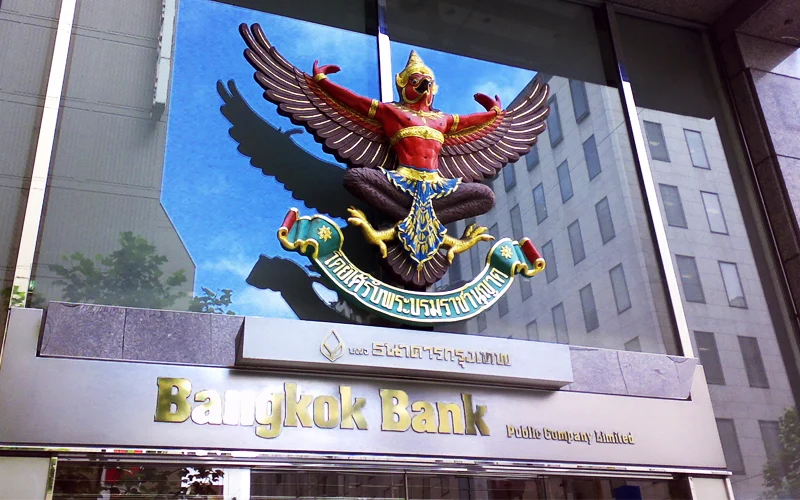Major commercial banks in Thailand have rushed to raise interest rates in response to the Bank of Thailand’s two consecutive rate hikes, sparking concern over rising financial costs that will eventually be passed on to businesses and consumers at a time when the Thai economy is still in the recovery stage from the Covid-19 pandemic.
Bangkok Bank, Thailand’s biggest lender, raised its lending rate by 30 to 40 basis points (0.30% to 0.40%) and increased its deposit rate by 15 to 50 basis points on Sept 29, immediately following suit on the Bank of Thailand’s policy rate hike on Sept 28.
Kasikorn Bank on Friday also raised its lending rate by 25 basis points, and other major banks are expected to go in the same direction due to rising costs caused by higher short-term interest rates in the market.
The Bank of Thailand raised its policy rate by 25 basis points in August, and another 25 basis points in September. Commercial banks’ hikes were mostly smaller than the central bank’s, as they have been adhering to the government’s message not to raise rates too much or too fast.
The government has asked for cooperation from state-owned banks – including the publicly listed Krung Thai Bank, the Government Saving Bank, the Bank for Agriculture and Agricultural Cooperatives, and the Government Housing Bank – to keep their rates unchanged until the end of the year in order to help reduce the impact on small and medium-size enterprises and vulnerable groups.
The request has exerted indirect pressure on commercial banks as well, resulting in their relatively small interest rate hikes.
Yet the gradual hikes have raised concern among business sectors that increasing financial costs could weigh on the Thai economy, which has not yet fully recovered after being hit hard by the Covid-19 pandemic, at a time when there are risks lying ahead, particularly the weaker Thai baht, a larger trade deficit and swollen household debt.
Industrial sectors in particular “have had higher costs immediately, and that will definitely have a negative impact on their operation and profit”, said Kriengkrai Thiennukul, chairman of the Federation of Thai Industries (FTI).
He said some sectors that rely heavily on massive capital outlays and loans are expected to be adversely affected, including construction, land developers, electronics industries, renewable energy and the petrochemical sector.
“What we are concerned about the most is small and medium enterprises,” he said, adding that SMEs largely have smaller capital resources and cash flows and are likely to face a liquidity crunch caused by rising interest rates.
Kriengkrai said although the FTI agreed with the BOT on increasing the policy rate in order to curb inflation, rising financial costs at a time when the country is facing other risks could weigh on the economy.
The Thai economy grew 2.4% in the first half of 2022 due largely to hefty exports and rebounding tourism, supported by a weaker baht and the government’s policy of fully reopening the country to foreign tourists.
However, the baht, which has dropped to a 16-year low of more than 37 per dollar, has caused alarm in business sectors, particularly leading importers of capital goods to hold back orders, and the effects of those reductions in spending on production should in turn lead exports to slow over the next few months.
Analysts said the baht is likely to continue weakening because the gap between Thai and US interest rates is big enough to spur capital outflows that drag the Thai currency down.
However, a weaker baht is likely to benefit the tourism industry, which accounts for around 18% of the country’s gross domestic product, by making Thailand cheaper for visitors. The Tourism Authority of Thailand (TAT) expects around 7 million to 10 million foreign tourists to visit the kingdom this year. Still, that is well below the 39 million tourists in 2019, before the country was hit by the pandemic.
The depreciating baht is also expected to worsen the country’s trade deficit.
Despite the hefty exports, Thailand had a trade deficit of 420 billion baht in the first seven months of this year, the highest level in 27 years, due largely to a weaker baht that made imports of capital goods and energy more expensive, and the rising trade deficit is expected to weigh further on the baht.
Apart from the weaker currency, an additional risk is rising household debt that dampens the economy. Thailand’s household debt stands at 14.8 trillion baht so far this year, accounting for 88% of GDP, a level that raised the alarm for the Bank of Thailand to take action.
BOT governor Sethaput Suthiwarnarueput said the central bank will monitor commercial banks very closely to make sure they do not launch campaigns to encourage consumers to borrow for unnecessary purchases, in order to keep household debt in check at a time when interest rates are on a rising trend.
The central bank will also monitor the spread between deposit and lending rates so they are not too wide, to avoid causing big financial burdens on small and medium-size enterprises.
Beyond this, the FTI has demanded government policies that would help businesses absorb the rising financial burden from higher interest rates at a time when the economy remains wobbly.
“We want the government to issue some debt rehabilitation project or some soft loan for SMEs, particularly those who had liquidity crunches, to allow them to continue their business operations,” said Kriengkrai of the FTI.- FMT








